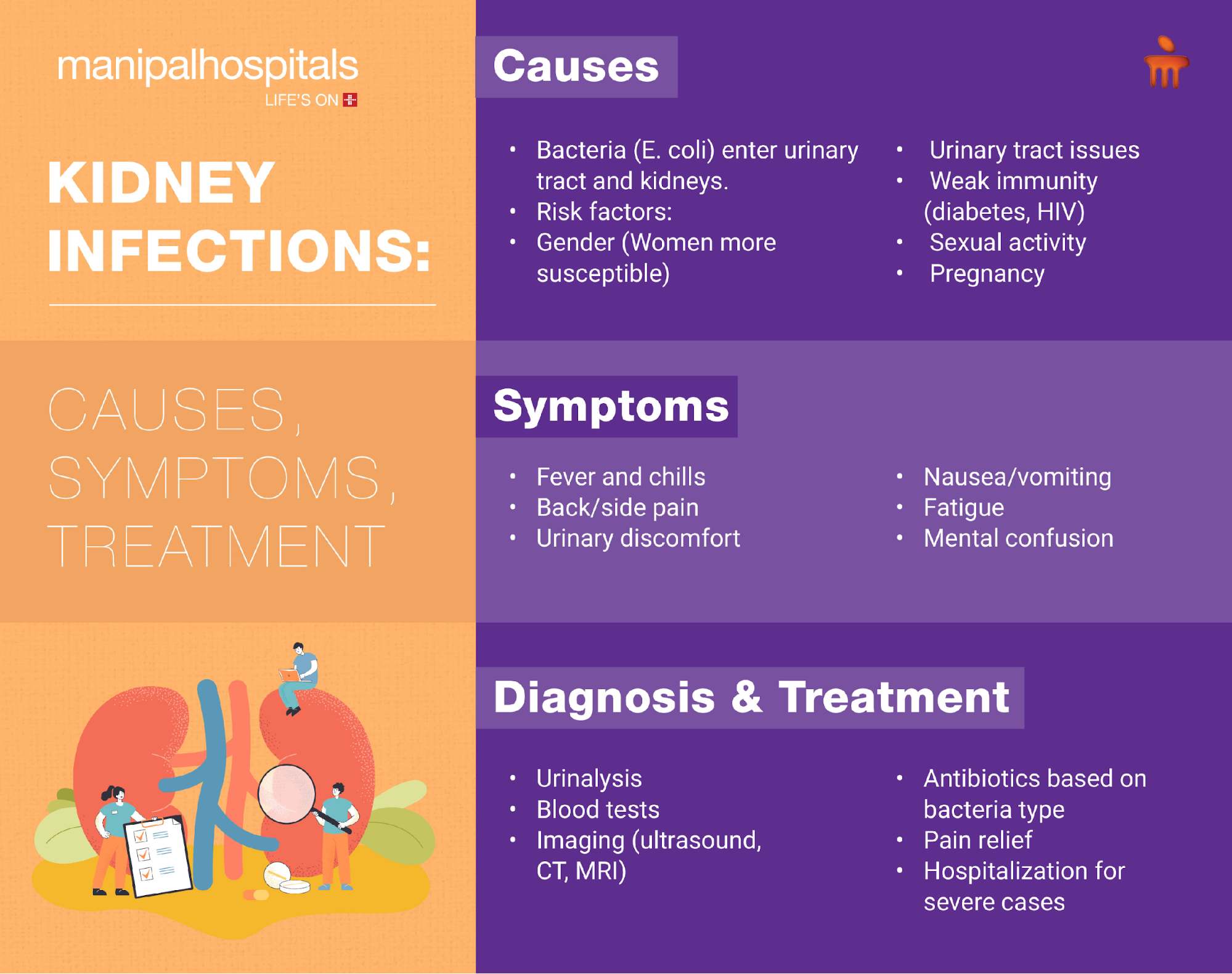
Kidney infections, also known as pyelonephritis, are a type of urinary tract infection that is a serious and potentially debilitating condition that can affect individuals of all age groups. This condition occurs when harmful bacteria enter and infect kidneys, leading to a range of uncomfortable symptoms and requiring prompt medical intervention. Let's understand the causes, symptoms, and treatment options for kidney infections, providing a comprehensive knowledge of this medical concern.
Research shows, that about one out of 2000 people suffer from a kidney infection every year.
Synopsis
Causes of Kidney Infections
One of the primary causes of kidney infections is bacteria or viruses, most commonly Escherichia coli (E. coli), entering the urinary tract and subsequently travelling to the kidneys. While anyone can develop a kidney infection, certain factors increase the risk:
-
Gender
Women are more susceptible due to their shorter urethra, which makes it easier for bacteria to reach the bladder and kidneys.
-
Urinary Tract Abnormalities
Conditions like kidney stones or structural abnormalities can obstruct urine flow, creating an environment conducive to bacterial growth.
-
Weak Immunity
Health conditions like diabetes or HIV compromise the immune system's ability to fight off infections.
-
Sexual Activity
Sexual intercourse can introduce bacteria into the urinary tract, increasing the likelihood of infection.
-
Pregnancy
Hormonal changes during pregnancy can alter urinary tract function, making infections more likely.
Symptoms that Raise the Alarm

Identifying the symptoms of a kidney infection is crucial for timely diagnosis and treatment. Common symptoms include:
1. Fever and Chills
Elevated body temperature accompanied by chills often indicates an infection.
2. Pain
Dull, aching pain in the lower back or side, near the affected kidney.
3. Urinary Symptoms
Burning sensation during urination, frequent urge to urinate, and cloudy or bloody urine.
4. Nausea and Vomiting
Kidney infections can cause nausea and vomiting, often accompanied by loss of appetite.
5. Fatigue
Infection-induced stress on the body can lead to fatigue and weakness.
6. Mental Confusion
Severe kidney infections might confuse, especially in the elderly or those with preexisting conditions
Consult our nephrology hospital if you are experiencing kidney infection symptoms.
Effective Treatment Options
When it comes to kidney infections, seeking medical attention is imperative to prevent complications. In Goa, a popular tourist destination with a burgeoning healthcare sector, finding suitable treatment is both accessible and essential. Nephrologists in Goa are well-equipped to diagnose and treat kidney infections, offering a range of personalized kidney infection treatment options.
1. Antibiotics
The cornerstone of kidney infection treatment, antibiotics, are prescribed to combat the underlying bacterial infection. The choice of antibiotics depends on the severity of the infection and the specific bacteria causing it. Completing the full course of antibiotics is crucial to ensure the infection is completely eradicated.
2. Pain Management
Over-the-counter pain relievers, as well as prescription medications, can help alleviate the discomfort associated with kidney infections. Nephrologists will determine the appropriate pain management strategy based on the patient's medical history.
3. Hospitalization
In severe cases, hospitalization may be necessary, especially if the infection is causing high fever, dehydration, or other complications. Intravenous antibiotics and fluids can be administered under medical supervision.
4. Underlying Causes
Nephrologists will investigate any underlying factors contributing to the infection, such as kidney stones or urinary obstructions. Addressing these issues can prevent future infections.
5. Follow-up Care
After the infection has been treated, regular follow-up appointments with a nephrologist are essential to monitor kidney health and prevent recurrence.
Nephrologists in Goa: Your Partners in Kidney Health
Goa boasts a growing healthcare infrastructure, making it an ideal destination for receiving top-notch medical care, including nephrology services. Nephrologists in Goa are highly trained professionals specializing in kidney health. Their expertise encompasses diagnosing kidney infections, offering tailored treatment plans, and providing valuable guidance on preventive measures.
Conclusion
Kidney infections can be painful and potentially serious if left untreated. Understanding the causes, recognizing the symptoms, and seeking timely treatment are crucial steps in managing this condition. In the vibrant state of Goa, where healthcare facilities are thriving, individuals have access to skilled nephrologists who can provide effective treatment options. By prioritizing kidney health and promptly addressing infections, individuals can enjoy a better quality of life and safeguard their overall well-being.





















 4 Min Read
4 Min Read




.png)













